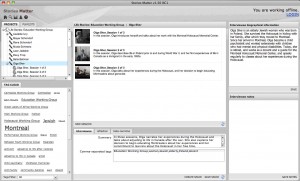What kind of story could you tell about yourself based on the contents of your pocket, backpack, handbag, or wallet?
That’s the question that the Pocketology Field Research Unit explores on Stories You Haven’t Heard. (Carol McLeod made me aware of pocketology). Here’s how the site describes pocketology:
Pocketology, the study of pockets, is an exploration of how objects we
interact with on a daily basis help form the story of our lives. The objects we accumulate in our daily experience become the puzzle pieces of our days; the evidence of how we live life as individuals in the context of larger communities. … Stories You Haven’t Heard [the official blog of the Portrait Gallery of Pocketology] is a place to tell and read about the parts of life that happen while we are busy making other plans. Excavating items we find in our pockets or backpacks (handbags, wallets, etc) we evaluate the origins of these often overlooked artifacts and honour stories that contribute to the larger picture of our daily lives. … All those who feel inspired are invited to dig into coat pockets and old wallets. Discover these artifacts and share your stories with the Pocketology community.
The site then invites visitors to email pocket stories, ideally with photos of the artifacts found in the storyteller’s pocket (or similar container).
I’m glad the site mentions backpacks, handbags, and wallets; otherwise, pocketology would be biased toward men. One of my pet peeves has always been that women’s clothing doesn’t have enough pockets. You can see some sample pocket stories on the site.
My second discovery is perhaps less of an approach than a tool for transcribing oral history. It’s a free software application called Stories Matter (v.1.5.1), described as a “database tool: a new media alternative to oral history transcription” that addresses this issue: “In transcribing our interviews, we lose the orality almost immediately thus shoring the narratives of much of their meaning.”
The folks at the Centre for Oral History and Digital Storytelling, developed the tool that allows oral historians “to clip, index and export audio and video recordings — and so it represents a real alternative to transcription.” The developers at Centre for Oral History and Digital Storytelling have been using Stories Matter extensively for the past six months and are in the process of building a large database for their Life Stories project, “which is interviewing survivors of war, genocide and other human rights abuses.”
I wish I could have downloaded Stories Matter and used it or at least taken a better look at it. The application uses Adobe AIR, and my computer got caught in an endless loop of trying to install AIR, to the point where I couldn’t open any of my applications (a memory issue perhaps?). I’d be interested in hearing if and how any readers are using it. You can get some sense of what the app is like by clicking on the small screenshot image below, which will take you a larger version of the image:
